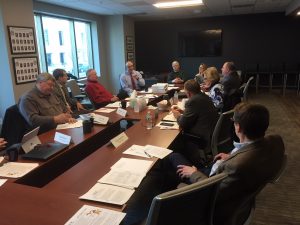Legislative Update 12-4-20
Extension on ‘no reason’ remote board sessions awaits House action

A bill to expand “no reason” remote sessions for local boards cleared a House committee this week but did not get an expected vote in the full House chamber.
House Bill 6207, by Rep. Luke Meerman (R-Ottawa), which would change the state’s Open Meetings Act, cleared the House Ways and Means Committee, but the full House adjourned without getting to it this week.
The bill would extend the ability for local boards to meet remotely, for any reason, through March 31, 2021. It would also allow a local ordinance declaring a local emergency approved by a “local chief administrative officer,” sufficient to allow for remote meetings. MAC, the Michigan Municipal League and Michigan Townships Association need modifications to the changes approved in October to ensure all jurisdictions, governing bodies and administrative officers would have the ability to declare local emergencies.
MAC is seeking a technical change to the most current version of the bill to reinsert “local governing body” to ensure boards that have already declared local emergencies are not affected and can be continued.
The bill is expected to move next week to the Senate and get to the governor’s desk before the end of the year.
For questions, contact Meghann Keit at keit@micounties.org.
Podcast 83 continues ‘lame duck’ episodes on Monday, Dec. 7
 In another special LIVE video edition of Podcast 83 at 3 p.m. on Dec. 7, MAC’s Executive Director Stephan Currie and MAC’s advocacy team will discuss the ongoing “lame duck” session of the Michigan Legislature.
In another special LIVE video edition of Podcast 83 at 3 p.m. on Dec. 7, MAC’s Executive Director Stephan Currie and MAC’s advocacy team will discuss the ongoing “lame duck” session of the Michigan Legislature.
Among topics to receive updates:
- Hot topics in the “lame duck” session
- Status of additional COVID aid to counties
The Podcast 83 crew also will be taking your questions during the live session.
Just click on this link to register for the podcast. As always, a recording will be placed on the Podcast 83 page at a later date.
Senate approves tax shift on solar equipment
 The bills that would exempt solar energy equipment from ad valorem property taxes and replace such levies with a payment In Lieu of taxes (PILT) system were approved by the Senate this week.
The bills that would exempt solar energy equipment from ad valorem property taxes and replace such levies with a payment In Lieu of taxes (PILT) system were approved by the Senate this week.
Senate Bills 1105 (by Sen. Curt VanderWall, R-Mason) and 1106 (by Sen. Kevin Daley, R-Lapeer) are now poised for swift action in the House.
The bill sponsors are advocates for the PILT approach because they represent areas that have been embroiled in litigation over the revenue that was expected when they allowed wind development. A PILT agreement between the developers and the local units would provide a flat payment for the duration of the agreement (as opposed to a declining revenue stream based on a depreciation schedule) and would drastically reduce litigation surrounding valuation and payments.
While those are positive changes for counties and MAC is supportive of the PILT concept, the association is not supporting these two bills.
The package would cap the reimbursements to local governments at $3,500 per megawatt of nameplate alternating current capacity (i.e., their generation capacity, not what they actually generate). MAC is opposed to this figure at this time because the experts who are studying it have not come up with an evaluation of the value or established if this is a fair reimbursement rate for each jurisdiction.
For example, this rate is less than 18 percent of what a full ad valorem tax rate would be on a currently established solar farm in East Lansing, though it may be a fair rate on rural land in outstate Michigan. More time is needed to determine appropriate reimbursements.
Also, MAC is seeking changes that will ensure local governments are not forced to accept solar developments; that require PILT payments will be collectable throughout the duration of the agreement; that require the equipment will be removed from the site once operations cease; and that includes language that will clarify that the real property on which the solar development is located is still subject to real property tax.
For more information on this issue, contact Deena Bosworth at bosworth@micounties.org.
Reforms suggested by jail task force advance
 Legislation inspired by a joint state-county task force on jail operations continued to advance in the Legislature this week, with the Senate sending bills to the House as part of an effort to finish them before the end of the year.
Legislation inspired by a joint state-county task force on jail operations continued to advance in the Legislature this week, with the Senate sending bills to the House as part of an effort to finish them before the end of the year.
Senate Bills 1046-1051 and SB 1125 would provide arrest alternative for some low-level offenders and modify probation and discharge eligibility.
The bills passed with overwhelming bipartisan support and are now before the House Judiciary Committee.
The House approved several reforms related to the task force earlier this year. In general, the House package would:
- Eliminate mandatory minimum jail sentences
- Eliminate driver’s license suspension as a penalty for offenses unrelated to dangerous driving
- Reclassify many traffic misdemeanors as civil infractions
MAC is supportive of most of the bills in the entire package but is neutral on SBs 1046 and 1048.
For questions, contact Meghann Keit at keit@micounties.org.
MAC looking for commissioners to join policy committees
 The key panels that drive MAC’s policy positions in Lansing and Washington, D.C., are looking for new members to join their ranks in January.
The key panels that drive MAC’s policy positions in Lansing and Washington, D.C., are looking for new members to join their ranks in January.
MAC’s six policy committees (see below) meet monthly between January and May and then again between September and December. The committees are designed to debate legislation, receive presentations from government leaders and interest groups and craft MAC platform language that is then reviewed and adopted by the Board of Directors and general membership.
“If you want to be in the thick of helping MAC establish good policy for Michigan counties, these committees are the place to be,” said Deena Bosworth, MAC director of governmental affairs.
To join, you are asked to fill out an application form, which then goes to MAC’s Board President Veronica Klinefelt for approval and assignment. Ordinarily, members would have the option to attend sessions at MAC’s offices in Lansing or via teleconference, but due to COVID, all committee sessions are virtual for now.
Committee schedule
- Finance and General Government – meets the 1st Friday at 10 a.m.
- Environmental/Natural Resources/Regulatory Affairs – meets the 2nd Friday at 10 a.m.
- Health and Human Services – meets the 4th Monday at 10 a.m.
- Judiciary and Public Safety – meets the 4th Monday at 2 p.m.
- Transportation and Infrastructure – meets the 4th Friday at 10 a.m.
- Agriculture and Tourism – meets at the call of the chair
For questions on the committee process, contact Bosworth at bosworth@micounties.org.
Poverty-based property tax exemption advances
 Bills that would extend a poverty exemption to the payment of property taxes by overburdened homeowners advanced out of House and Senate committees this week.
Bills that would extend a poverty exemption to the payment of property taxes by overburdened homeowners advanced out of House and Senate committees this week.
Senate Bill 1234, by Sen. Jim Runestad, R-Oakland, and House Bill 4828, by Rep. Wendell Byrd, D-Wayne, would continue the tax relief originally spurred by the COVID-19 outbreak and resulting economic and jobs crisis. The measures would extend the tax relief to 2023. SB 1234 is now before the full Senate, while HB 4828 is before the House Ways and Means Committee.
MAC is neutral on SB 1234 and has yet to take an official position on HB 4828.
For more information on this issue, contact Deena Bosworth at bosworth@micounties.org.
Long-needed Headlee rollback fix introduced
 A long-need alteration to how property values are handled under the Headlee Amendment was introduced in the House this week.
A long-need alteration to how property values are handled under the Headlee Amendment was introduced in the House this week.
House Bill 6454, by Rep. Jim Ellison (D-Oakland), would change how Headlee rollback calculations are done. The bill will take out the increase in taxable value resulting from the “pop up” once a property changes ownership. By eliminating the “pop up” value increase from the rollback calculation, counties and other local governments will be able to actualize the increase in property tax revenue resulting from the sale and right-sizing of the property value, without being penalized by enhancing the millage reduction fraction requirements.
Some counties across the State regularly engage in Headlee rollback override votes, while other counties do not. This does not negate the rollback provision. It will not change the upper limit on millage rates and would not change the inflationary limit on increases to properties that do not change ownership.
MAC supports this legislation and is looking forward to discussions on the matter either this legislative session or next year.
For more information on this issue, contact Deena Bosworth at bosworth@micounties.org.
Webinar offers training on autism, intellectual developmental disorders
 In a live webinar on Friday, Dec. 11, county leaders can gain the knowledge and skills required to provide effective, equitable service to people with intellectual and/or developmental disabilities, including autism spectrum disorder.
In a live webinar on Friday, Dec. 11, county leaders can gain the knowledge and skills required to provide effective, equitable service to people with intellectual and/or developmental disabilities, including autism spectrum disorder.
The session, which will run from 10 a.m. to noon, has content that is a culmination of information from a partnership of mental health and law enforcement professionals. Development and funding for this course is courtesy of the Michigan Department of Health and Human Services.
The class is free, with registration covered by funds made available by the Michigan Department of Health & Human Services. Click here to register. https://attendee.gototraining.com/r/6023386791939959042
 Staff picks
Staff picks
- State budget director asks for $730 million supplemental budget to help during COVID-19 (UpNorthLive.com)
- MDHHS releases draft plan on vaccine distribution in Michigan (MDHHS)
- Mask mandates work to slow spread of coronavirus, Kansas study finds (NPR)
- 2020 Emerging Trend: Access to Care Part 3 – Justice-Involved Populations (Community & State)







